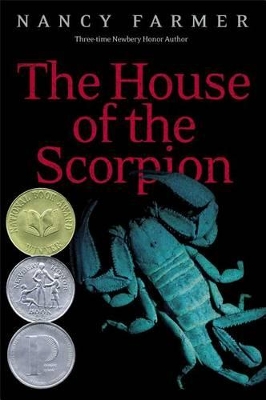Reviewed by mary on
I'd say the first two thirds of the book are riveting. This story is not just a clone story. Yes, it is horrifying in how it examines the (familiar) debate about a clone's humanity and soulless(ful)ness. Matt is a clone and is defined by people around him as livestock, a source of body parts, and not a human being. Nancy Farmer takes Matt's character on a journey of self-discovery and self-awareness that allows him to accept that he is not what he is told he is, that he is as much of a human being as any person around him. It is a compelling journey, even though its sentiment isn't particularly new to me - I've read Never Let Me Go.
But, thankfully, there is more to distinguish The House of the Scorpion from similar stories.
First, the novel is set in Mexico (well, a future version of it). This country's life is written richly and authentically and never feels like just an exotic backdrop. I am no expert on Mexican culture though, so I might have felt more in awe with the descriptions in this book than others.
Second, this is a story of a drug lord and his enslaved family. El Patrón feels he is owed a few generations worth of life, and he will stop at nothing to get what he thinks he is entitled to. Cloning is a part of his plan for immortality. It's in Matt's relationship with his master and owner where the story shines the most. How would a clone feel about the person who is identical to him, the source of his life? Would he be able to hate him, essentially hating himself? If a clone's genetic make-up is similar to that of a ruthless criminal, does it mean that this clone is destined to follow the same path and become the same vicious person? Or is there a way to break away from the prototype? And how would a master feel about his own clone? Would it be possible for him to treat this younger version of himself as an organ bank, or there exists a connection that is closer than even that between a father and a child? These questions had my brain working, and this part of the book was 5-star material for me.
The one part that made this book only a 4/5 stars for me, was the fact that I found myself struggling with the last third of this book. It was harder for me to get through and most of the time I found myself bored in that part of the story. I didn't feel that those pages connected well thematically with the overreaching story arc, I didn't think they were necessary. I thought, those pages only occupied time with no real bearing on the rest of the novel.
Thankfully, the ending did save The House of the Scorpion. It happens so infrequently in books, but it did bring the story full circle to El Patrón, and it was satisfying. I do highly recommend this book, it is a powerful story that raises interesting and important questions about immigration, bioethics, and drug policy.
Reading updates
- Started reading
- 1 March, 2015: Finished reading
- 1 March, 2015: Reviewed
